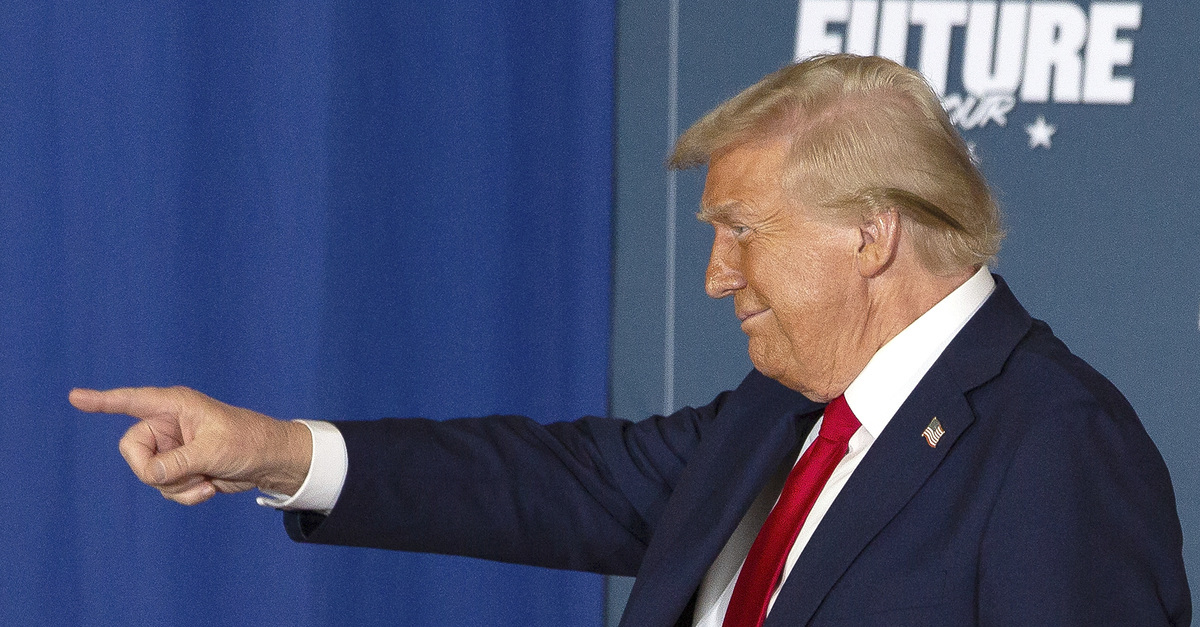
Then-Republican Candidate for President Donald Trump attends the Building America’s Future, Southeastern Pennsylvania Roundtable at the Drexelbrook Event Center on October 29, 2024 in Drexel Hill, Pennsylvania (Matt Bishop/imageSPACE/Sipa USA via AP Images).
A federal judge in Washington, D.C., handed the Trump administration a substantial win on Friday by allowing the government to further “dismantle” the U.S. Agency for International Development (USAID).
In a 26-page memorandum opinion, U.S. District Judge Carl J. Nichols, a President Donald Trump appointee, dissolved a previous temporary restraining order and denied a request for a preliminary injunction.
On Feb. 7, the plaintiffs, two government employees unions led by the American Foreign Service Association — which is the exclusive representative for the U.S. Foreign Service — filed a lawsuit accusing Trump of “unlawful actions” that “exceed presidential authority and usurp legislative authority conferred upon Congress by the Constitution, in violation of the separation of powers.”
Later that same day, Nichols granted a “limited” temporary restraining order barring the government from placing USAID employees on administrative leave and performing expedited evacuations of such employees from their overseas posts. The order rejected a request to block a 90-day pause on “foreign assistance funding.”
Now, after motions practice on a request for extended relief, additional declarations from interested parties, and “multiple hearings” on the matter, the court determined the two unions “have not demonstrated that they or their members will suffer irreparable injury” and that their claims are unlikely to succeed on the merits.
The judge essentially takes his cues from a Thursday opinion in the same district court concerning similar efforts by government workers to pump the brakes on the widespread downsizing efforts.
In that earlier opinion, U.S. District Judge Christopher Cooper, a Barack Obama appointee, determined he lacked jurisdiction to hear the complaints of unions whose members are on the chopping block.
The Friday opinion takes the same route.
In a discussion that purports to take stock of the merits, Nichols instead looks to systems in place for federal workers to adjudicate labor disputes. Those systems, the court muses, are where the brunt and majority of the workers’ concerns should be lodged.
“Congress has established ‘comprehensive’ statutory schemes governing the review of employment disputes arising between the federal government and its civil and foreign service officers,” the opinion reads. For civil servants, the applicable scheme is set forth in the Federal Service Labor-Management Relations Statute (FSLMRS) and the Civil Service Reform Act (CSRA).”
Nichols explains the process, at length:
Under those statutes, “labor disputes” involving civil servants — i.e., disputes in which unions are involved — are generally adjudicated by an agency called the Federal Labor Relations Authority (FLRA) — while “personnel” disputes — i.e., disputes about adverse “personnel action[s]” taken against individual civil servants — are generally adjudicated by an agency called the Merit Systems Protection Board (MSPB).
…Here, even if the farthest reaches of plaintiffs’ lawsuit involve “separation-of-powers issues” and “whether a statute or the Constitution has authorized the President to act in a particular way,” the “preliminary” questions the lawsuit poses are plainly employment-related — such as the lawfulness of the government’s changes to plaintiffs’ members’ employment conditions
The judge, however, also says that the plaintiffs might have a point — but only if their most dire claims are borne out in the future.
“[I]t may be the case that, at a high level of generality and in the long run, plaintiffs’ assertions of harm could flow from their constitutional and APA claims regarding the alleged unlawful ‘dismantl[ing]’ of USAID,” the opinion goes on. “But at present, the agency is still standing, and so the alleged injuries on which plaintiffs rely in seeking injunctive relief flow essentially from their members’ existing employment relationships with USAID.”
In law, the concept of “irreparable harm” means the kind of detrimental action that cannot be cured with money. And, in terms of injunctive relief, findings of such harm are paramount. The court says there isn’t really any of that happening here.
In a different section of the opinion, the judge even says the initial claims made by the plaintiffs took liberties with the truth.
“[T]he government’s subsequent submissions have convinced the Court that plaintiffs’ initial assertions of harm were overstated,” the opinion goes on.
The judge singles out multiple claims for such treatment — including one widely-publicized apparent misstatement regarding currently-abroad USAID expatriates being forced back stateside.
That claim, the court says, simply is not true.
[P]laintiffs argue that their members will be irreparably harmed by what they initially described as a “mandatory recall notice” requiring more than 1,400 USAID employees stationed overseas to “repatriate within 30 days,”” the opinion reads. “The record now reflects that no USAID employee stationed abroad has been or imminently will be required to return to the United States within thirty days. Rather, as matters presently stand, USAID employees stationed abroad have been given a choice. If they wish to return to the United States within thirty days, they may do so, and will be eligible for agency-funded and arranged return travel.”








